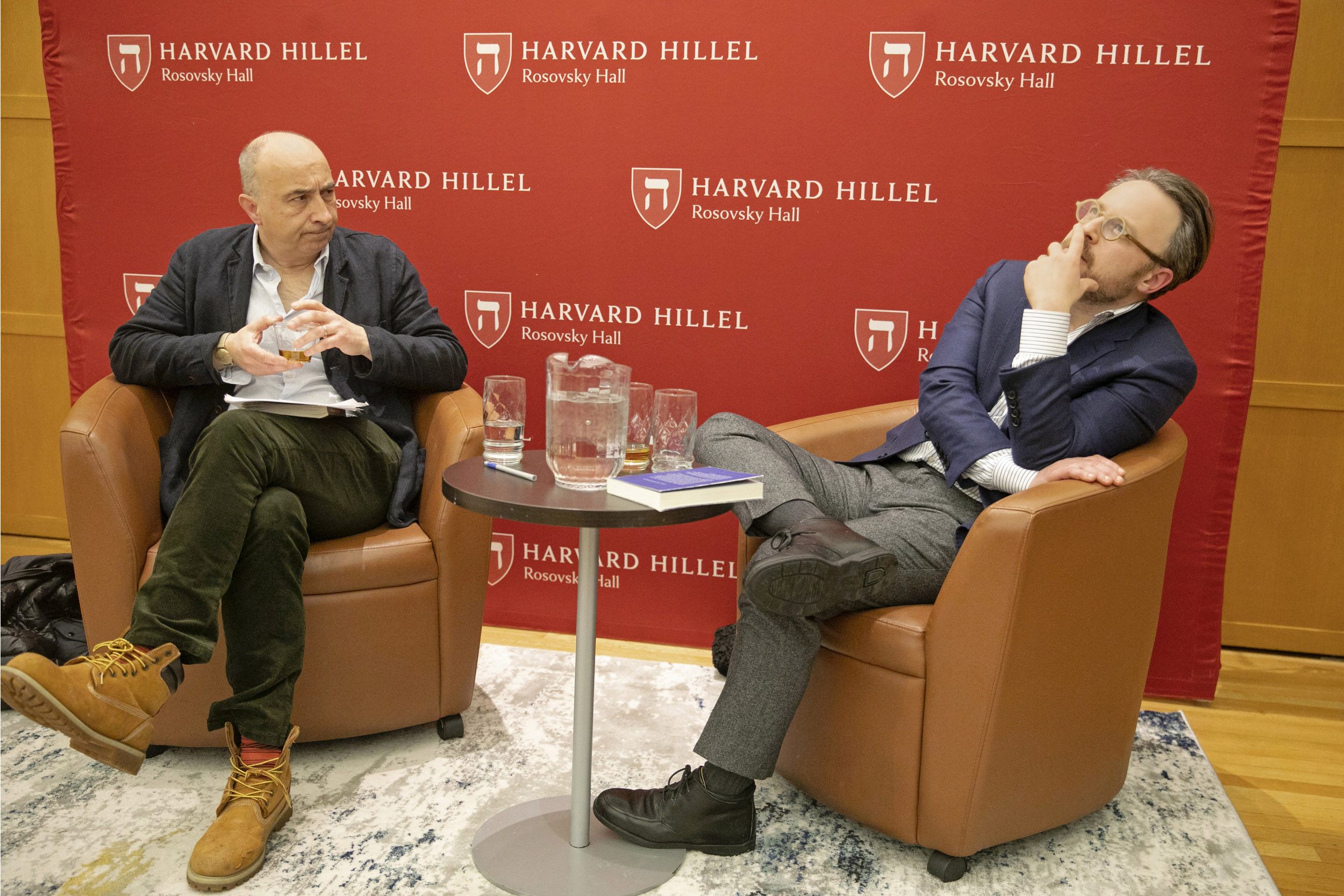
During a Harvard Hillel talk, Joshua Cohen (right) tells James Wood that 24 publishers rejected “The Netanyahus” before it was accepted by New York Review Books.
Jon Chase/Harvard Staff Photographer
‘That’s not how the story went’
Writer Joshua Cohen talks to New Yorker critic and professor James Wood about creation of his Pulitzer-winning novel ‘The Netanyahus’ at Hillel event
Novelist Joshua Cohen arrived at Harvard Hillel’s Rosovsky Hall on a recent icy night, stomping his feet and shrugging the snow off his black overcoat with a wide, furry lapel. The New Yorker staff writer and book critic James Wood, professor of the practice of literary criticism, followed.
It was exactly the type of night that Cohen describes in his account of Dr. Benzion Netanyahu’s disastrous arrival at the fictionalized Corbin College in 1960. It was hard not to see Cohen’s coat and think of the shearling version he dresses the entire Netanyahu family in as they spill out of their Ford and into his story, winner of the 2022 Pulitzer Prize.
Seated at a tiny table with an enormous beer pitcher of water, both speakers looked down modestly as Rabbi Dani Passow, Hillel’s senior director of public and alumni programs, introduced them and their accolades to an in-person audience of 60 and a virtual literary salon of 600, all gathered to hear the two discuss Cohen’s “The Netanyahus: An Account of a Minor and Ultimately Even Negligible Episode in the History of a Very Famous Family.”
While some other people were iterating sourdough recipes during the COVID-19 lockdown, he was pounding out this book. “Everything was just very depressing, so I wrote what I thought was just a completely pointless book,” he said.
It struck Cohen as perverse that if the world was in fact ending he would probably “go out” working on this project. He told Wood that 24 publishers rejected the manuscript before it was accepted by New York Review Books.
When it comes to the writing process, Cohen said he often thinks back to a conversation he once had with a man who was part of the early American sitcom boom and noted that the industry’s titans were mostly former garment workers. The guy told Cohen that whether conjuring fashion or a show, “It’s just like making garments. It’s all about cutting.”
Cohen claimed that with his own work, “I write, and I write, and I write, and I write, and it’s all bad until I cut. I realized that if I cut in the right place it’s suddenly good — or OK.”
“Tell us how the germ of the novel came about,” Wood asked.
“I’ll tell you the honest version for the first time,” Cohen teased.
He went on to explain how the ailing, now late literary critic Harold Bloom invited him to New Haven, Conn., to help write a final memoir. While they were talking, the TV playing on mute in Bloom’s living room flashed footage of Benjamin Netanyahu, prime minister of Israel. In passing, Bloom mentioned he’d met a young “Bibi” at age 10 and his father as well.
Just then, Bloom’s wife, Jeanne Gould, popped into the room and quipped, “That’s not how the story went, Harold. This is how it went …”
It was from that patchy mismatch of memories that Cohen conjured “The Netanyahus,” a masterful work of fiction based on a nonfiction event in which Netanyahu (father of Benjamin) schlepped his wife and three sons to Yale (which in Cohen’s telling becomes Corbin, modeled after Cornell) to interview for a faculty position.
Woods summarized the plot. “The narrator, Ruben Blum, a historian of taxation, is the first Jewish academic at private Corbin College and is tasked by the head of the department to be host for what is a job interview for a new faculty position. The person applying for the job is coming to give a lecture, have an interview, and have a nice dinner and so on is Ben-Zion, the father of the future prime minister and a scholar of Medieval Iberian politics and religion.”
Blum is tokenized by his WASP colleagues, and Netanyahu, a true zealot who struggles with “refugee guilt” for being sidelined in the U.S. rather than on the ground fighting to establish the state of Israel, regards the American as a marionette. The two Jews clash horribly yet, to Cohen’s credit as a writer, somehow it comes across by turns squeamishly, tragically, and comically.
Cohen says the book examines, “How are we to suffer for our ideas? How are we to deal with disagreements?” Netanyahu “has three or four ideas that he will die for,” but Blum has the luxury of debating these issues removed from their reality while eating crudités — at least until the faith-shaking ending.
The conversation was part of an ongoing Hillel Speaker Series started virtually during the pandemic. The evening represented the first lecture in hybrid format — an arrangement that Passow plans to continue.




